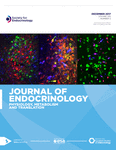Protein kinase STK25 aggravates the severity of non-alcoholic fatty pancreas disease in mice
- Esther Nuñez-Durán1,
- Belén Chanclón1,2,
- Silva Sütt1,
- Joana Real2,
- Hanns-Ulrich Marschall3,
- Ingrid Wernstedt Asterholm2,
- Emmelie Cansby1 and
- Margit Mahlapuu1⇑
- 1Department of Molecular and Clinical Medicine, Lundberg Laboratory for Diabetes Research, Institute of Medicine, University of Gothenburg, Sahlgrenska University Hospital, Gothenburg, Sweden
- 2Department of Metabolic Physiology, Institute of Neuroscience and Physiology, University of Gothenburg, Gothenburg, Sweden
- 3Department of Molecular and Clinical Medicine, Wallenberg Laboratory, Institute of Medicine, University of Gothenburg, Sahlgrenska University Hospital, Gothenburg, Sweden
- Correspondence should be addressed to M Mahlapuu; Email: Margit.Mahlapuu{at}gu.se
Abstract
Characterising the molecular networks that negatively regulate pancreatic β-cell function is essential for understanding the underlying pathogenesis and developing new treatment strategies for type 2 diabetes. We recently identified serine/threonine protein kinase 25 (STK25) as a critical regulator of ectopic fat storage, meta-inflammation, and fibrosis in liver and skeletal muscle. Here, we assessed the role of STK25 in control of progression of non-alcoholic fatty pancreas disease in the context of chronic exposure to dietary lipids in mice. We found that overexpression of STK25 in high-fat-fed transgenic mice aggravated diet-induced lipid storage in the pancreas compared with that of wild-type controls, which was accompanied by exacerbated pancreatic inflammatory cell infiltration, stellate cell activation, fibrosis and apoptosis. Pancreas of Stk25 transgenic mice also displayed a marked decrease in islet β/α-cell ratio and alteration in the islet architecture with an increased presence of α-cells within the islet core, whereas islet size remained similar between genotypes. After a continued challenge with a high-fat diet, lower levels of fasting plasma insulin and C-peptide, and higher levels of plasma leptin, were detected in Stk25 transgenic vs wild-type mice. Furthermore, the glucose-stimulated insulin secretion was impaired in high-fat-fed Stk25 transgenic mice during glucose tolerance test, in spite of higher net change in blood glucose concentrations compared with wild-type controls, suggesting islet β-cell dysfunction. In summary, this study unravels a role for STK25 in determining the susceptibility to diet-induced non-alcoholic fatty pancreas disease in mice in connection to obesity. Our findings highlight STK25 as a potential drug target for metabolic disease.
- Received 18 April 2017
- Accepted 25 April 2017
- Made available online as an Accepted Preprint 25 April 2017
- © 2017 The authors
 This work is licensed under a Creative Commons Attribution 3.0 Unported License..
This work is licensed under a Creative Commons Attribution 3.0 Unported License..











